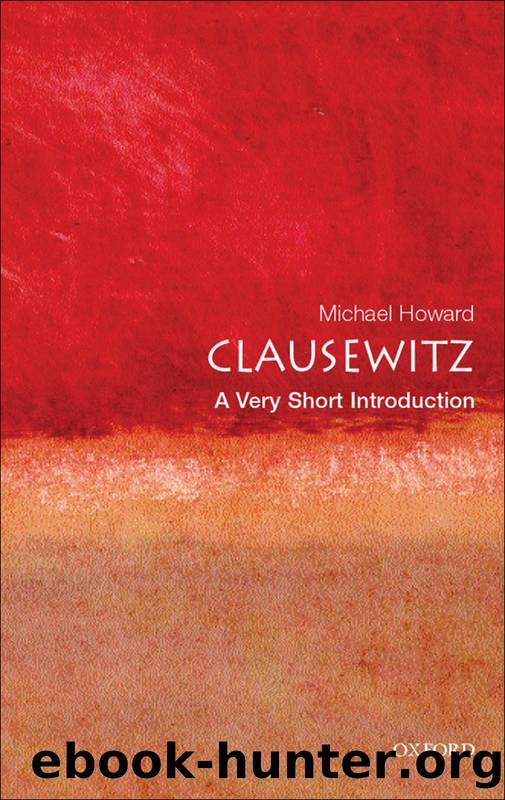Clausewitz by Howard Michael;

Author:Howard, Michael;
Language: eng
Format: epub
Publisher: Oxford University Press
Published: 2003-02-14T16:00:00+00:00
Chapter 4
Limited and absolute war
The distinction which Clausewitz drew between âlimitedâ and âabsoluteâ (or âtotalâ) war, and which twentieth-century political and strategic thinkers have found so significant, did not emerge as the result of any long and profound thought. He was, as we have already seen, only 24 when he first stated that wars could be of two kinds, those fought for the elimination of the opponentâs political independence (seine Staatenexistenz aufzuheben) and those fought to obtain favourable terms of peace. There is no indication that either he or anyone else at the time saw anything remarkable in the idea. But in a note written in 1827, twenty-three years later, when he had been at work on On War for a dozen years and had drafted three-quarters of the book, Clausewitz wrote that it was now necessary for him to go over the whole thing again to âbring out the two types of war with greater clarity at every pointâ (p. 69). So although the distinction between the two must have always been in his mind, as for anyone who had experienced both the wars of the eighteenth century and those of Bonaparte, the fundamental importance of this dichotomy for his theory only struck him as he was writing. To be precise, it seems to have struck him halfway through the sixth book of On War, that on Defence, when he realized that here more than anywhere else the commander needed to know whether he was fighting âthe kind of war that is completely governed and saturated by the urge for a decisionâ, or one that approximated rather to âa war of observationâ (pp. 488â9). Why this distinction was particularly important in planning a defensive campaign we shall see later in this chapter.
Clausewitz considered it necessary for his reader not only to appreciate that there were two types of war, but to understand exactly why this should be so. In fact he provided three distinct explanations: one historical, or sociological; one metaphysical; and one empirical. Each occurs in a different section of On War, and is set out with little relation to the other two. They were not indeed entirely mutually compatible.
Historically, Clausewitz pointed out, all wars were the products of the societies that fought them. Like all other institutions war was shaped by the ideas, the emotions, and conditions prevailing at the time. How this had affected the development of warfare he explained in what must have been the earliest survey of the sociology of war from the earliest times to his own day. Having described how war was made and supported by the Tatar hordes, the republics of antiquity, the Roman Empire, the political authorities of the Middle Ages, and the condottieri of the early modern period, he focused on the development of the sovereign states of eighteenth-century Europe. By then, he showed, monarchs had obtained such effective political and economic control over the peoples they ruled that they were able to create war machines distinct and separate
Download
This site does not store any files on its server. We only index and link to content provided by other sites. Please contact the content providers to delete copyright contents if any and email us, we'll remove relevant links or contents immediately.
| Automotive | Engineering |
| Transportation |
Whiskies Galore by Ian Buxton(40505)
Introduction to Aircraft Design (Cambridge Aerospace Series) by John P. Fielding(32346)
Small Unmanned Fixed-wing Aircraft Design by Andrew J. Keane Andras Sobester James P. Scanlan & András Sóbester & James P. Scanlan(32146)
Craft Beer for the Homebrewer by Michael Agnew(17462)
Turbulence by E. J. Noyes(7057)
The Complete Stick Figure Physics Tutorials by Allen Sarah(6646)
Kaplan MCAT General Chemistry Review by Kaplan(6066)
The Thirst by Nesbo Jo(5792)
Bad Blood by John Carreyrou(5780)
Learning SQL by Alan Beaulieu(5423)
Weapons of Math Destruction by Cathy O'Neil(5046)
Man-made Catastrophes and Risk Information Concealment by Dmitry Chernov & Didier Sornette(4748)
iGen by Jean M. Twenge(4705)
Digital Minimalism by Cal Newport;(4566)
Life 3.0: Being Human in the Age of Artificial Intelligence by Tegmark Max(4519)
Audition by Ryu Murakami(4105)
1,001 ASVAB Practice Questions For Dummies by Powers Rod(4045)
Electronic Devices & Circuits by Jacob Millman & Christos C. Halkias(4041)
Pale Blue Dot by Carl Sagan(4017)
